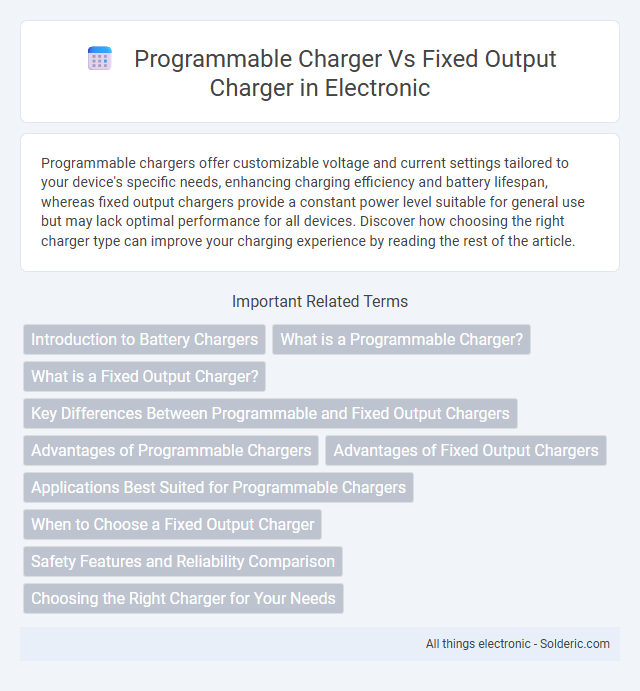Programmable chargers offer customizable voltage and current settings tailored to your device's specific needs, enhancing charging efficiency and battery lifespan, whereas fixed output chargers provide a constant power level suitable for general use but may lack optimal performance for all devices. Discover how choosing the right charger type can improve your charging experience by reading the rest of the article.
Comparison Table
| Feature | Programmable Charger | Fixed Output Charger |
|---|---|---|
| Output Voltage | Adjustable, user-defined | Fixed, manufacturer preset |
| Output Current | Configurable within range | Fixed value |
| Use Case | Flexible applications, testing, prototyping | Standard, dedicated device charging |
| Cost | Higher due to advanced features | Lower, simple design |
| Control Interface | Digital controls, display, sometimes remote | Basic, often no interface |
| Safety Features | Overvoltage, overcurrent, thermal shutdown | Basic protection, if any |
| Efficiency | Optimized for variable loads | Optimized for fixed load |
| Flexibility | High customization | Limited to one output |
Introduction to Battery Chargers
Battery chargers convert electrical energy into stored chemical energy by supplying the appropriate voltage and current to recharge batteries safely and efficiently. Programmable chargers offer customizable charging profiles, allowing precise control over voltage, current, and charging time to optimize battery health and lifespan. Fixed output chargers provide a constant voltage or current, suitable for simple, standardized battery types but may lack the flexibility needed for advanced or sensitive battery systems.
What is a Programmable Charger?
A programmable charger allows you to customize voltage, current, and charging duration to match specific battery requirements, enhancing safety and efficiency. Unlike fixed output chargers that deliver a constant voltage or current, programmable chargers adapt to various battery chemistries, ensuring optimal charging profiles. This flexibility protects your batteries from overcharging and extends their lifespan by precisely controlling the charge parameters.
What is a Fixed Output Charger?
A fixed output charger delivers a constant voltage and current, designed to power devices with specific charging requirements. It lacks the ability to adjust settings, providing a steady, predetermined output ideal for simple, uniform battery types. Due to its consistent output, it ensures reliable and straightforward charging but cannot optimize performance for varying device demands like programmable chargers.
Key Differences Between Programmable and Fixed Output Chargers
Programmable chargers offer customizable voltage and current settings, allowing precise control tailored to specific battery types and charging requirements, unlike fixed output chargers that provide a constant, unchangeable output. Fixed output chargers are simpler and typically cheaper, designed for general use with standardized batteries, but lack the flexibility to optimize charging conditions for varying needs. Your choice depends on whether you need adaptable charging parameters for specialized batteries or a straightforward solution for common devices.
Advantages of Programmable Chargers
Programmable chargers offer precise voltage and current control, enhancing battery health and extending lifespan by adapting to the battery's specific requirements. These chargers provide flexibility for different battery types and chemistries, improving charging efficiency and safety. Advanced features such as customizable charge profiles and real-time monitoring optimize performance and reduce the risk of overcharging or overheating.
Advantages of Fixed Output Chargers
Fixed output chargers provide consistent voltage and current settings tailored precisely to specific devices, ensuring reliable and safe charging without the risk of incorrect configurations. Their simplicity enhances durability and reduces costs, making them ideal for mass production and widespread use. Fixed output chargers offer high efficiency and compatibility with standard batteries, supporting straightforward plug-and-play operation.
Applications Best Suited for Programmable Chargers
Programmable chargers excel in applications requiring precise control over charging parameters, such as in research laboratories, battery testing, and electric vehicle development. These chargers allow customization of voltage, current, and charge cycles, making them ideal for experimenting with new battery chemistries or ensuring optimal battery lifecycle management. Your projects benefit from their flexibility and accuracy, enabling tailored charging profiles for specific battery types and conditions.
When to Choose a Fixed Output Charger
Choose a fixed output charger when your device requires a constant, stable voltage and current, ensuring reliable and safe charging without the need for adjustments. Fixed output chargers are ideal for simple electronics or applications with predictable power demands, eliminating the complexity and cost associated with programmable alternatives. Your choice simplifies maintenance and ensures consistent performance in scenarios where customization is unnecessary.
Safety Features and Reliability Comparison
Programmable chargers offer advanced safety features such as customizable voltage and current limits, thermal protection, and automatic shutoff, enhancing reliability in diverse charging scenarios. Fixed output chargers rely on preset parameters, which may limit protection against overcharging or overheating in specific devices. Your choice of charger impacts device longevity and safety, with programmable options providing greater adaptability and consistent performance monitoring.
Choosing the Right Charger for Your Needs
Programmable chargers offer customizable voltage and current settings, making them ideal for varied applications and precise battery management. Fixed output chargers provide consistent power delivery with simplicity and reliability, best suited for standard devices with specific charging requirements. Selecting the right charger depends on the device specifications, usage scenarios, and the need for flexibility or straightforward operation.
Programmable charger vs Fixed output charger Infographic

 solderic.com
solderic.com